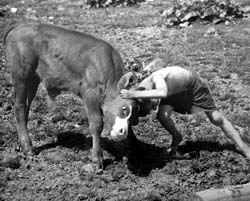Harvest for the sake of the future
More than 350,000 children work in Ukraine, half of them in agriculture
Every year one child dies while working in the agricultural sector, and 15 children are severely injured.
Last year a 16-year-old schoolboy died at the agricultural company Prohres in Vinnytsia oblast, while working on a pig farm, after he was accidentally dragged into a conveyer. All efforts to rescue the boy failed. A criminal suit was brought successfully against the company that allowed the underage boy to work around dangerous machinery. But the boy’s grief- stricken parents will never get their son back.
According to statistics, there are over 350,000 working children in Ukraine, 46 percent of whom work in agriculture. The average age of these young laborers is 12. In most cases, their work week lasts considerably longer than an adult’s. Experts say that the worst working conditions are found in agriculture, street trading, unauthorized coalmines, the entertainment industry, and other illegal activities.
“Crops for the sake of the future: agriculture without child labor” was the slogan of a press conference held last week by the International Labour Organization (ILO) which focused attention on the inadmissibility of heavy agricultural labor performed by children. A special concern is children who work with heavy machinery and pesticides. Volodymyr Fidelsky, head of the Department of Plastic and Reconstructive Microsurgery, showed journalists horrific photographs of children with traumas received while working on farms or in agricultural companies. Some journalists nearly fainted at the sight of fingers, arms, and legs that had been torn off.
“Recently we treated a 12-year-old boy named Stepan, whose arm got caught in a conveyor while digging potatoes. The boy was wearing his father’s sweater, which was too big for him, and the clothing was pulled into the machine,” Dr. Fidelsky explained. “Children most often injure their hands on straw and chaff choppers and their feet, on mowing machines and combine harvesters. If an injured person is brought to hospital in time, we can reattach the missing limbs. But in most cases the body part will not function well.”
Raisa Mazna, a representative of the Trade Union Committee of the Agricultural Complex, is convinced that poor living conditions are the main reason behind child labor in agriculture. The average monthly salary of agricultural workers is 552 hryvnias. In some oblasts it is even lower: the average salary in Volyn and Zhytomyr oblasts is 355 and 380 hryvnias, respectively. A survey of villagers shows that their biggest problems are feeding and clothing their families. So their children have to go to work from a young age. “Despair has led peasants to establish so- called small farms that function by exploiting each member of the family. Children start working from the age of six or seven. The current legislation on children allows this (laws on private village homesteads and farms) which has lowered the working age to 14,” Mazna stressed.
Iryna Vasylenko, who heads a department at the State Labor Agency, said that inspectors visited 736 enterprises where child labor was being exploited and flagged violations at 245 of them. This means that over 1,500 minors are working in conditions forbidden by law. The inspectors found 20 children working with dangerous machinery and 12 in other dangerous conditions. Every tenth child was not officially registered, and 13 percent worked overtime. Nearly one-third of all children involved in agricultural labor have health problems.
“Child labor symbolizes the enrooting of poverty, hinders the educational process (most children miss school) and impedes their physical and intellectual development,” says Tetiana Minenko, national manager of an international program aimed at eradicating the worst labor conditions in Ukraine. “Ukraine has ratified the ILO’s Minimum Age Convention, which is aimed at eradicating the worst conditions of child labor. Every employer should follow it. An important role in eradicating child labor should be played by children themselves, who have the final say in whether they should work.
Above all, the state’s policy on developing the private agricultural sector should be changed, so that peasants do not have to earn a living through their children’s blood and sweat.”






